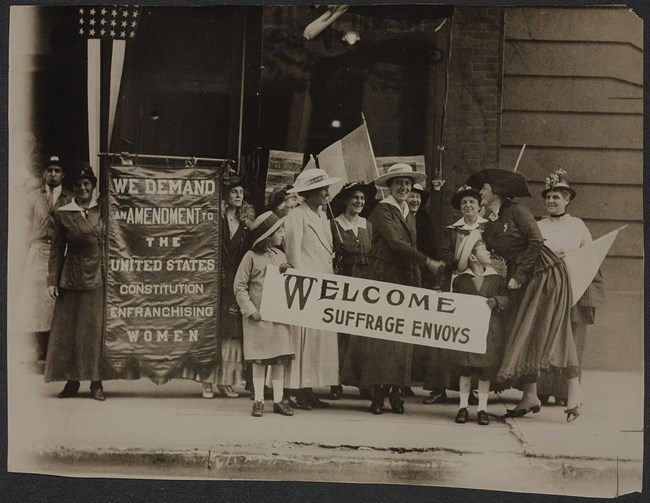Last updated: July 3, 2018
Article
Did You Know: Women and African Americans Could Vote in NJ before the 15th and 19th Amendments?

Did you know that some women and African Americans won and lost the right to vote before the 15th and 19th Amendments to the Constitution became law?
Case Study: New Jersey
The 19th Amendment gave women the right to vote, but some New Jersey women could vote as early as 1776. New Jersey’s first constitution in 1776 gave voting rights to “all inhabitants of this colony, of full age, who are worth fifty pounds … and have resided within the county … for twelve months.” In 1790 the legislature reworded the law to say “he or she,” clarifying that both men and women had voting rights. But only single women could vote because married women could not own property. Still, many unmarried women voted in New Jersey in the 1790s and the very early 1800s.
African Americans in the state could vote if they met the residency and property requirements. In 1797, the New Jersey government required voters to be free inhabitants. We do not know if enslaved African Americans voted before this law was passed -- the property requirements made that unlikely, but no law specifically prohibited them from doing so.
In 1807, the state legislature restricted suffrage (voting rights) to tax-paying, white male citizens. This was done to give the Democratic-Republican Party an advantage in the 1808 presidential election. Women often voted for the opposing Federalist Party, so taking away women’s voting rights helped the Democratic-Republicans. This law also took voting rights away from African Americans.
New Jersey was not alone in granting and then taking away the vote from women and African Americans around the turn of the 1800s. In 1870, the 15th Amendment to the Constitution was passed. It stated that “the right of citizens of the United States to vote shall not be denied or abridged by the United States or by any State on account of race, color, or previous condition of servitude.” But, it excluded women and those considered non-citizens at the time. In 1920, the 19th Amendment to the Constitution was passed. It stated that “The right of citizens of the United States to vote shall not be denied or abridged by the United States or by any State on account of sex,” giving women the right to vote. Despite these Constitutional Amendments, laws and customs generally prevented African Americans from voting until the passage of the Civil Rights Act in 1965 guaranteed access to the vote.
Learn about Women's Struggle for the Vote with lesson plans from Teaching with Historic Places:
- A Woman's Place is in the Sewall-Belmont House [now the Belmont-Paul Women's Equality National Monument]: Alice Paul and Women's Rights
- Lafayette Park: First Amendment Rights on the President's Doorstep
- Mary McLeod Bethune Council House: African American Women Unite for Change
- M'Clintock House: A Home to the Women's Rights Movement
- Discover the M'Clintock House and Women's Rights National Historical Park: A Lightning Lesson from Teaching with Historic Places
Visit National Parks That Tell These Stories
Tags
- belmont-paul women's equality national monument
- mary mcleod bethune council house national historic site
- women's rights national historical park
- new jersey
- the vote gained and lost and gained again
- women's history
- womens history
- african american history
- voting rights
- suffrage
- suffrage movement
- civil rights
